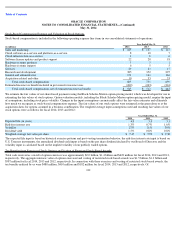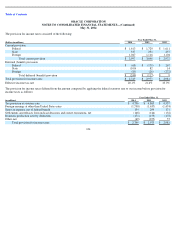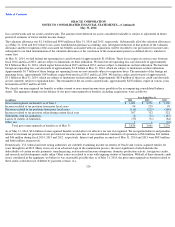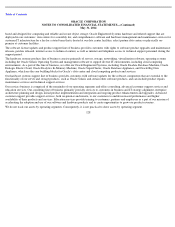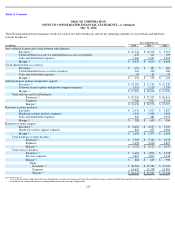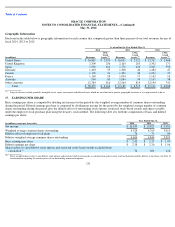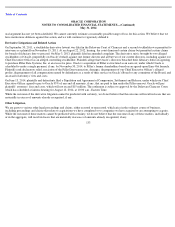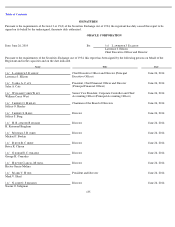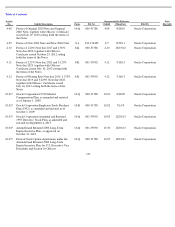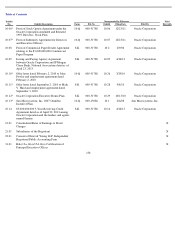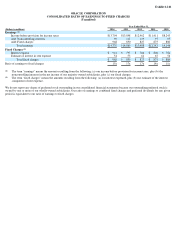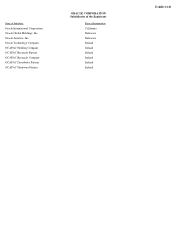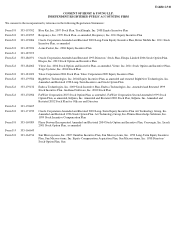Oracle 2013 Annual Report Download - page 136
Download and view the complete annual report
Please find page 136 of the 2013 Oracle annual report below. You can navigate through the pages in the report by either clicking on the pages listed below, or by using the keyword search tool below to find specific information within the annual report.
Table of Contents
ORACLE CORPORATION
NOTES TO CONSOLIDATED FINANCIAL STATEMENTS—(Continued)
May 31, 2014
SAP Intellectual Property Litigation
On March 22, 2007, Oracle Corporation, Oracle USA, Inc. and Oracle International Corporation (collectively, Oracle) filed a complaint in the
United States District Court for the Northern District of California against SAP AG, its wholly-owned subsidiary, SAP America, Inc., and its
wholly-owned subsidiary, TomorrowNow, Inc., (the SAP Subsidiary, and collectively, the SAP Defendants) alleging that SAP unlawfully
accessed Oracle’s Customer Connection support website and improperly took and used Oracle’s intellectual property.
Trial commenced on November 1, 2010 on the issue of damages, as SAP had stipulated to liability. The jury awarded Oracle $1.3 billion. On
September 1, 2011, the court granted the SAP Defendants’
motion for judgment as a matter of law and for a new trial. The court vacated the $1.3
billion award and held that Oracle could either accept a reduced amount or remittitur of $272 million or proceed to a new trial. On February 6,
2012, Oracle rejected the remittitur and requested a new trial.
On August 2, 2012, Oracle and the SAP Defendants stipulated to a judgment of $306 million against the SAP Defendants, in lieu of having a
second jury trial, while preserving both parties’ rights to appeal prior court orders. We recorded a $306 million non-current receivable, included
in other assets, in our consolidated balance sheet and we recognized a corresponding benefit to our results of operations for the first quarter of
fiscal 2013. Previously during trial we received payment of $120 million in attorneys’ fees from SAP under a stipulation, and we recorded this
payment upon receipt as a benefit to our results of operations during the second quarter of fiscal 2011. On August 3, 2012, the court entered the
judgment and vacated the date set for the new trial. Oracle filed a Notice of Appeal on August 31, 2012, and the SAP Defendants filed a notice
of appeal on September 14, 2012. The SAP Defendants subsequently dismissed their appeal. Oracle’s appeal has been fully briefed. The
appellate court heard oral argument on May 13, 2014. The court has not yet ruled on this appeal.
Hewlett-Packard Company Litigation
On June 15, 2011, Hewlett-Packard Company (“HP”) filed a complaint in the California Superior Court, County of Santa Clara against Oracle
Corporation alleging numerous causes of action including breach of contract, breach of the covenant of good faith and fair dealing, defamation,
intentional interference with prospective economic advantage, and violation of the California Unfair Business Practices Act. The complaint
alleged that when Oracle announced on March 22 and 23, 2011 that it would no longer develop future versions of its software to run on HP’s
Itanium-based servers, it breached a settlement agreement signed on September 20, 2010 between HP and Mark Hurd (the “Hurd Settlement
Agreement”), who was both HP’s former chief executive officer and chairman of HP’
s board of directors. HP sought a judicial declaration of the
parties’ rights and obligations under the Hurd Settlement Agreement, and other equitable and monetary relief.
Oracle answered the complaint and filed a cross-complaint, which was amended on December 2, 2011. The amended cross-complaint alleged
claims including violation of the Lanham Act. Oracle alleged that HP had secretly agreed to pay Intel to continue to develop and manufacture the
Itanium microprocessor, and had misrepresented to customers that the Itanium microprocessor had a long roadmap, among other claims. Oracle
sought equitable rescission of the Hurd Settlement Agreement, and other equitable and monetary relief.
The court bifurcated the trial and tried HP’s causes of action for declaratory relief and promissory estoppel without a jury in June 2012. The
court issued a final statement of decision on August 28, 2012, finding that the Hurd Settlement Agreement required Oracle to continue to
develop certain of its software products for use on HP’s Itanium-based servers and to port such products at no cost to HP for as long as HP sells
those servers. Oracle has announced that it is appealing this decision. The issues of breach, HP’s performance, causation and damages, HP’s tort
claims, and Oracle’s cross-claims will all be tried before a jury. As of April 8, 2013, the trial is stayed pending Oracle’s appeal of the court’s
denial of its anti-SLAPP motion, which is fully briefed, although
132
18.
LEGAL PROCEEDINGS


